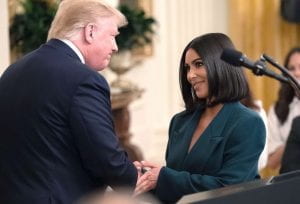The Rise of Democratic Elitism in the Era of Celebrity Politics
Haley Szramoski, ’23 Public Policy and Administration, Madison Center Democracy Fellow
From 2001 to 2003, Arnold Schwarzenegger, famous for starring as The Terminator in the popular film series, served as the governor of California; Donald Trump went from CEO and reality TV star to the 45th President of the United States in 2016. Kanye West, world-famous rapper and producer, made a failed bid for President of the United States in 2020. There are numerous examples of celebrity politicians beyond just these three. Together, they all play a role in the increase of democratic elitism, which has become a topic of growing concern in recent years with divided opinions regarding the matter. Democratic elitism refers to the belief or idea that a select group of individuals, who are deemed to be more knowledgeable, should make a decision on behalf of society as a whole. The link between celebrities in politics and democratic elitism is shown by the fame and influence of a star placing power. Either into themselves or into the endorsement of a candidate or idea. This has the potential to lead to a situation where a small group of individuals, including celebrities, are driving the conversations around what is best for society while ignoring the voices of the broader population.
The rapid growth of the internet being used for information has caused celebrities to become some of the most influential people in the world. This has led to a growing support of stars to speak out against political issues, with some arguing in favor of this new job title. A celebrity’s popularity and visibility can bring attention to important issues and help engage the public in politics. Kim Kardashian is an excellent example of someone with power using her immense platform to inform the public. Over the past few years, she has worked with The Justice Project to support prison reform efforts and help the wrongly accused be freed from jail. 
Similarly, singer-songwriter Taylor Swift has been credited with using her platform to influence political change. In 2018, Swift encouraged her fan base to register to vote via Instagram, where she has a following of over 240 million. Vote.org later said they received one of their most extensive website visits, with over 65,000 registrations in 24 hours since Swift’s post. Kardashian and Swift’s efforts highlight the effectiveness of celebrity involvement in politics. When widely known individuals with a large following speak out, they can positively impact society. It can help raise awareness, encourage civic engagement, provide financial support, and even bring a new perspective to the spotlight that is typically ignored.
On the contrary, many oppose the influx of celebrities into politics, arguing that their lack of political experience and their reliance on the media over policy expertise may harm the credibility of the political system. Past president Donald Trump utilized his Twitter following of over 30 million followers to engage with his supporters and also boast about his opinions and potential policy. The 45th President turned Twitter into a political tool that helped him get elected, later he would be banned due to the risk of further incitement of violence in 2021. Additionally, because celebrities do not have the same level of political expertise as those who study the matter, they are more susceptible to spreading misinformation to a large audience. In 2012 a viral YouTube video was shared entitled “Kony 2012,” created by a small non-profit called Invisible Children, whose purpose was to expose African warlord Joseph Kony, who recruited child soldiers. Upon its release, the video was shared by big names in Hollywood, like Rihanna and Justin Biber, and it quickly became one of the most viral videos of all time. Almost immediately following the video’s rise in popularity, it was met with loads of controversy. Viewers argued that the footage shined more light on Kony than the bigger problem facing central Africa. Others began questioning the integrity of the non-profit that created the video, and some even accused the organization of participating in the white savior complex. The video’s success is partly due to celebrities sharing its content with their large followers for more to see; this creates our current media problem of stars sharing information without proper research beforehand to understand the issue better.
What exactly does this all mean for the future of democracy? On the one hand, the involvement of celebrities in politics can help mobilize younger and more diverse voters who may be more likely to engage with politics when presented in a more accessible and entertaining way. Additionally, the high profile of celebrities can bring attention to important social and political issues that might otherwise be overlooked, their influence can help amplify marginalized communities’ voices and bring new perspectives to the political arena. Nonetheless, there are also severe potential drawbacks to the involvement of celebrities in politics. One element is that their presence may contribute to the concentration of power and influence in the hands of a small group of elites, perpetuating democratic elitism, intentional or not. Likewise, the involvement of celebrities in politics can sometimes create a distraction from the substantive issues at hand. There is a risk that political debates and discussions can become more focused on personalities and celebrity culture than on the policies and principles that are most important to democracy. The involvement of Hollywood stars in politics can be both good and bad. Celebrities can bring new energy and attention to the political process; however, it is crucial to recognize the potential risks of their presence in the political sphere. The future of democracy will depend on the ability of political leaders, including celebrities, to engage with the public in a meaningful and productive way that hopefully builds a level of trust between leaders and the general public.

Recent Comments